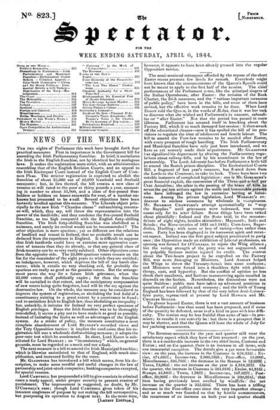The semi-sessional retrospect afforded by the repose of the short
Easter recess presents few deeds for remark. Everybody might have known that the announcements of the Queen's Speech could not be meant to apply to the first half of the session. The chief performances of the Parliament come, like the principal singers of
the Italian Operahouse, after Easter: the revision of the Bank Charter, the Irish measures, and the "various important measures of public policy," have been in the bills, and some of them have arrived, but the effective work remains to be done. When Lord &nos told the Queen, in the words of !Bolus, that it was her task to discover what she wished and Parliament's to execute, subaudi- tus est "after Easter." Not that the period has passed in mere idleness. Parliament has amused itself in knocking about the Factory Bill, which it so much damaged last session : it then struck off the educational clauses-now it has spoiled the bill of its pro- visions to regulate the time of adolescent and female labour. The bill to amend the Poor-law remains to be mauled after Easter, with every prospect of rough handling. The Irish Parliamentary and Municipal franchise have only just been introduced, and we have as yet scarcely made their acquaintance. Mr. GLADSTONE has signalized his department by altering the Parliamentary regu- lations about railway-bills, and by his amendment in the law of partnership. The Lord-Advocate has before Parliament a little bill to amend the Scotch prison-discipline. The Ecclesiastical Courts Bill, a fragment of last year's measure, has floated down from the Lords to the Commone, to take its luck. There have been two notable instances of completed legislation : one is Mr. Gostasuae's great financial exploit, the conversion of the Three-and-a-half per Cent Annuities.; the other is the passing. of the brace of bills to arrest the gaarn actions against the noble end-honourable persons who have infringed the law in excessive belting at horse- races. Among the private legislation' Lord WORSLEY'S en- deavour to enclose commons by wholesale is caaspicuous. Mr. SHARMAN CRAWFORD'S attempt systematically to "stop the Supplies" until grievances were redressed, was conspi- cuous only for its utter failure. Some things have been talked about plentifully : Ireland and the State trial, in the monster- debate of eight nights, besides skirmishes ; Maynooth ; India and Scinde ; the Slave-treaties of 1831 and 1833; Corn-laws, Sugar- dirties, Duelling; with more or less of variety-less rather than more. Party has been displayed in its narrowest spirit and mean- est aspect. Ireland was the first great subject prostituted to party uses : the Opposition made an exhibition of Liberal professions, an opening was formed for O'CoNNELL to rejoin the Whig alliance ; but the votineb strength of the party was not augmented, and its palpably factious motive injured its credit. The contest about the Ten-hours project to be engrafted on the Factory Bill, was mere damaging to Ministers. Lord ASHLEY helped the Whigs to throw the Treasury-bench into sonic confusion ; and Ministers were forced into a thankless fight with philan- thropy, cant, and hypocrisy. But the conflict of opinion no less shook their assailants, and factious manceuvering again recoiled in discredit on the faction. Nevertheless, the discussions were not quite fruitless : public men have taken up advanced positions in questions of social politics and economy; and the birth of Young England has been followed by that of the very infant Anti-Laissez- fake party, represeeted at present by Lord Howice. and Mr. CHARLES DULLER.
To glance beyond Easter, there is not a vast amount of business before Parliament : less than usual has been proposed, and if some of the quantity be defeated, some is of a kind to pass with less di culty. The session may be less fruitful than some of late-in pro- mises; in results it can scarcely be : but there is a prospect that it may be shorter, and that the Queen will have the whole of July for her yachting amusements.


























